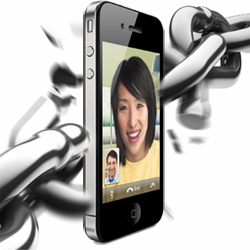Earlier this week NTIA petitioned the FCC to adopt a rule requiring wireless carriers to unlock the cell phones of customers and former customers who request it, and today the New York Times editorialized in support. While such a rule would solve the immediate problem of cell phone unlocking, it would be a band-aid solution that avoids dealing with the real problem: the DMCA’s anti-circumvention provisions.
As I’ve explained before, the cell phone unlocking issue is just one symptom of a greater problem, namely that it is illegal for you or any third party you contract to unlock content that you own. This affects not just phones, but also e-readers, music and video players, and even garage door openers and printer cartridges in the view of some. So I have to disagree with CDT when it says, “Perhaps the best feature of the NTIA’s approach is that it skips the absurd debate over copyright and DMCA exemptions and treats phone unlocking as what it is – a telecom issue.”
Cell phone unlocking, despite what the name might lead you to think, is not a telecom issue; it’s a DMCA issue. You can see this if you think about all the restrictions that remain in place even if the FCC were to adopt the NTIA’s proposed rule. For example, the rule forces carriers to unlock your phone at your request, but it would still be illegal for you to unlock your own phone, or to have a third party (such as a competing carrier that wants your business) unlock your phone.
Bottom line: It’s really strange to solve a problem created by Section 1201 of the DMCA by turning to the FCC to force carriers to give up their rights under the DMCA. Indeed, it removes a contractual possibility from the market because under the rule a carrier could no longer contract with a consumer to keep the phone unlocked for the duration of the contract. That’s an option that should be available to carriers and consumers. Any fix to this DMCA-created problem must leave the freedom to contract alone. The better way to address cell phone unlocking is to have the FCC stay out of what is an issue that Congress needs to address. Rep. Lofgren’s Unlocking Technology Act, for example, does just that.



 The Technology Liberation Front is the tech policy blog dedicated to keeping politicians' hands off the 'net and everything else related to technology.
The Technology Liberation Front is the tech policy blog dedicated to keeping politicians' hands off the 'net and everything else related to technology.